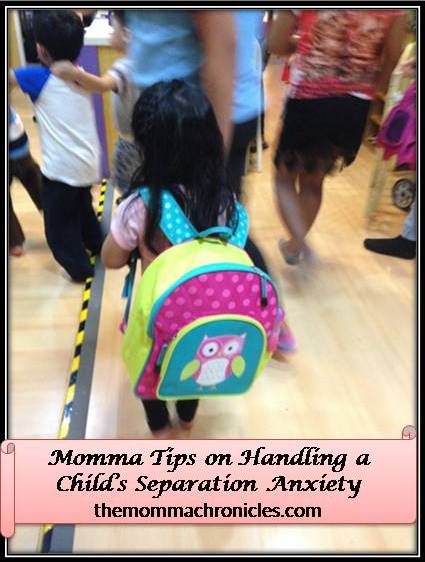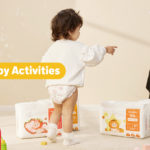Two weeks ago, my eldest daughter had her first week in school. Despite ample preparation (here are tips on how to prepare your child on his/her first day), leaving her inside the classroom with people she doesn’t know will surely lead to a crying fest. Even if she is excited to go to school, I know that it will not be a stress-free transition.
According to the Psychology Today website, separation anxiety is a development stage wherein a child experiences anxiety due to separation from the mother or other primary caregiver. Experts and the preschool teachers in my daughter’s school also said that crying and clinginess are normal during the first few weeks. Eventually, it will get better once the child got used to the teachers and the school environment.
I saw this on my daughter. On the fourth day of school, I left the classroom and see if she could handle herself without me on her side. Well, she cried. This made me realize that dealing with separation anxiety is not going to be easy. We’re still in the process of getting over my daughter’s separation anxiety but after two weeks, I am proud to say that she is slowly getting over her “fear.” Here’s what I did.
1. Always be early.
Punctuality or being early has a lot of advantages, especially at this stage. It allows the child to adjust, play with the teachers and classmates and help build a soothing environment.
I figured there is a reason why preschools encourage playtime before class starts. It helps kids become comfortable and at ease with the new setting, thereby minimizing anxiety in case you decide to leave the classroom.
2. Bring a comfort / security object.
If your child has a security blanket, make sure that you bring it in school. Having something your child is familiar with could help him/her adjust in a new environment. Contrary to popular belief, having a security blanket is not a sign of your child’s weakness. In fact, it helps him/her cope with unfamiliar situations, making it easier to adjust. Read more about security blanket here.
Before I left the classroom, I specifically instructed my daughter’s teachers to have Pooh (her security blanket) within reach. It helped her calm down a bit and ease any stress she felt during the few minutes I was away.
3. Stay with your child for a few days.
Leaving your child in an unfamiliar environment could lead to crying fest. I heard a lot of crying from the other class when parents left their kids on the first day. I have nothing against this but this could lead to a child’s withdrawal or refusal to go to school.
Staying with your child for a few days could ease tension, stress or anxiety. This assures him/her that you will be there until s/he is ready to be on his/her own. Sticking around for a few days while within clinging distance will also help your little one build enough courage to explore since s/he knows you are there. Then, slowly leave.
A piece of advice: even if you stay with your child, make sure not to meddle with their activities. Allow the teachers to do their jobs in assisting your child inside the classroom. This sends your child a message s/he can trust the teacher even if you’re not around.
4. Encourage interaction.
Interaction encourages independence and an improvement in a child’s social skills. Encouraging your child to interact with other kids and teachers helps him/her build confidence and trust with the people around. This also helps your child become at ease with the new environment.
5. Talk to your child’s teacher.
THIS IS A MUST. Every child is different. Despite their years of experience in teaching, teachers still don’t know your child’s needs and what could upset him/her. They will also encounter kids who are different from the others. Therefore, it is important to keep communication lines open between you and your child’s teacher. Relay information that could help in making the transition smooth and stress-free as possible. This could help them easily address your child’s issues in case the situation calls for it.
6. Remind constantly.
Surprisingly, kids possess a certain kind of maturity at an early stage. They seem like they don’t understand what you are talking about when in fact, they have their own way of deciphering every word you say.
Just constantly remind your child that mommy has to go out while s/he will stay with teacher. Provide assurance that you are out there, waiting for him/her so there’s nothing to worry.
7. Practice separation.
This is my biggest challenge. My kids are attached to me, to the point they watch me take a shower or always on my tail. To help my eldest prepare for school, I bring her in my parents’ house and let her stay there the whole day on weekends. This way, she’ll get used to not having me around.
Aside from this, establish goodbye cues. Walking out of the classroom when they are not looking could stir violent reactions and incessant crying. This could also make your child more uneasy and encourage more clinging. My daughter and I practice saying goodbye to each other every time I bring her to my parents’ house or leave her in school. So far, effective and no crying.
8. Be patient.
This is another challenge for me. I am not the most patient person in the room and get easily annoyed when my daughter doesn’t want me to leave. I secretly hope she’ll get over it instantly – but that’s not that easy.
Patience. Patience. Patience. If your child has difficulty letting you go, just be patient. In a few weeks, s/he will get over the anxiety.
9. Allow the teachers to deal with your child.
This is the first tip the preschool teachers in A’s school told us during orientation. It is normal for kids to long for their parents especially on the first few weeks. However, don’t storm inside the classroom as soon as you hear your child cry. This creates an impression that as soon as your kid cries, s/he knows that mommy is just outside and will come to the rescue. The goal is to let your child’s teacher take over, even for three hours everyday. Teachers are used to this kind of situation. Relax.
10. Don’t rush.
More importantly, never rush. Don’t force your child to be away with you. Dealing with a child’s separation anxiety is a process. It doesn’t happen instantly and requires time. It may take a while but there will come a time when your child will stop crying when you are out of sight.
UPDATE: My youngest daughter experienced separation anxiety by the third week of school. What we did was allowed to stay inside the classroom for a week. The following week, we established that mommy’s spot is outside the classroom, by the door while her spot is inside the classroom. We left the door a bit open so she can take a peek every time she feels uneasy. We also practiced closing the door, but when she opens it, she can still see that I am there. The next week, she was able to get over separation anxiety, but I still stay at my spot outside the classroom so that she knows I’m outside every time she opens the door. Her teachers always assured her that mommy is just waiting outside.
How about you mommas? Any tips on how to get over your child’s separation anxiety?
Note: I’m neither a parenting expert nor earned a degree in any parenting-related field. All of these are based on my personal experience in handling my daughter’s separation anxiety.

Ayi is a stay-at-home mom of two. When her kids are in their best state, she keeps up with chores, work, and ensuring that her sanity is intact. Join her as she navigates through this rollercoaster ride called motherhood.














Great tips, Mommy Ayi!
While we are planning to homeschool our daughter, I’m pretty sure we would have to deal with separation anxiety one way or another – especially pa that she’s an introvert. Oh well, we’ll cross the bridge when we get there; but I’ll definitely keep your tips in mind! 🙂
I;m glad you found these tips useful 🙂
I guess I’m just lucky that my angel jenae was able to get over it in a couple of days during her summer school… But I guess my way was a bit drastic as on the first day I just left her there and she cried… But on the second and third day she’s still excited to go and she even said goodbye to me and didn’t cry.. 🙂
Iba-iba talaga ang kids 🙂 Maybe your daughter is used to having other people around her kaya easy for her? Hehehe
When my eldest started going to preschool I stayed for maybe 2 weeks! He was among the last to adjust. Good thing with my youngest, she was okay with school from the first day.
Same here! On the third week, the teachers “encouraged” me to step out of the classroom so my daughter will get used to them. She cried a lot but she finally got over it. Lol!
Would have loved to read this before my youngest started first week of june. Twas good to know it was less hassle for you and daughter.
It’s a bit stressful but thankfully, she learned to be on her own.
Luckily, we didn’t have separation anxiety episodes. We are now on our second week and still going great.
I hope your child will enjoy school and trust her teachers soon.
Xoxo
MrsMartinez
Good for you 🙂 My daughter is okay na during the third week – finally! There were crying episodes at first but she got used to the teachers and her classmates eventually.
I have the same experience before mga two days I stayed with him sa school during his toddler school. But when he had his kumon that is the time when he learn to have a discipline. Kaya when he starts na in big school nagpapiwan agad 🙂
My daughter also just started attending her first school. Good thing I never had any issues leaving her since we prepared for it. Last summer I let her join Jollibee’s one week talent camp where she really enjoyed meeting new friends. Also, I guess she’s okay being left because she’s already 4yrs old so I think pretty independent na at that age.
I never had to deal with this with my kids. I wonder why….
I saw a lot of kids on the first day of Daycare where my daughter goes, experience the same thing. Gladly, my daughter was quite independent that we didn’t go through this. I just set her expectations. The other parents would just abruptly leave and not let their kids know.
Attending summer camp may help. Seeing familiar faces or things again at first day of school at some point is an assurance .
these are really nifty tips on overcoming separation anxiety. it really is a must that mums prepare their children, and themselves, for a smooth and tear-free temporary separation when they go to school.
My daughter is not yet going to school, but lately, she seems to be very clingy not just with me but also with her Dad and nanny. She always wants us to be with her literally beside her. Hahaha! Thanks for sharing some of the tips, this would surely help once my daughter gets to school next year.
These tips will really be of big help for me and my son once he starts to go to school. Thanks for sharing!
We’re homeschooling in my son’s presechool years but we had a few short stints in learning centers. He was asking me to stay inside during the first few sessions but he quickly adjusted with his teachers so I just had to stay outside and wait for him to finish. Talking to our children’s teachers is important. They will know our children more through our accounts and will help her deal with their attitude and needs.
My second daughter just started school this year. I understand the crying fest you have to go through the first few weeks. And leaving them without permission will really make things worse. But it got better because my daughter made friends and she brings her security blanket in school. Her security blanket is her Toothless happymeal toy from McDo.
When my eldest went to school last year for Pre-K, I was the one with sepanx, not him! As in, he was so excited going to school. And he was, every single time! I’m the one with a knot in the stomach. Lol!
Funny story. Ngayon ko lang na-gets yung “Sepanx” LOL :)) Anyway, I was a bit annoyed when my daughter doesn’t want me to leave. But when I can finally do, parang ako naman ang ayaw mag-let go.
My eldest took almost two months before the sepanx faded away. You have a great list on how to conquer separation anxiety. All parents pass this challenging stage and I’m glad that I can say that “I’m not alone” 🙂
I’ve always heard about separation anxiety but I never experienced that with my kids. I guess they were sanay na because I worked in an office before I became a work at home mom. Siguro I will have sepanx when they get to grow up and want to be independent na.